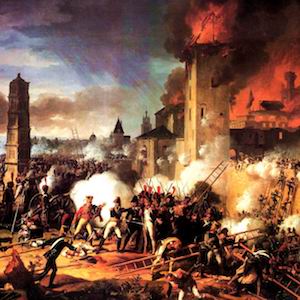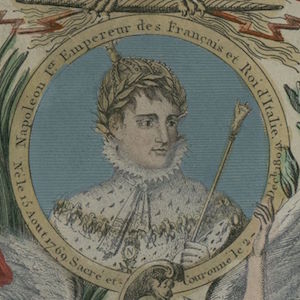Modern (1800 CE - 1950 CE)

Battle For and Taking of Ratisbon, April 23, 1809
The general peace agreement lasted a scant two years after the treaty of 1801.

Sire, They Are My Sons and My Wife
Napoleon cultivated the intense personal loyalty of his troops with engravings like this one, which suggests a personal interest in the ordinary soldier.

Meeting of the Emperors at Tilsit
In July 1807, Napoleon and Alexander agreed to cooperate. Napoleon used this strategy to prevent his enemies from forming an alliance against him.

The Royal and Imperial Family of Napoleon
The remainder of the text on this image reads: Emperor of the French, King of Italy, and Protector of the Confederation of the Rhine. The military flags make clear the connection between military conquest and imperial glory.

Retreat from Russia
There was not much to celebrate in the Russian campaign, especially once the retreat from Moscow began. Print depicting the horrific conditions and loses suffered by the French army as it retreated from Moscow in the winter of 1812.

Triumph of the Year 1813
Napoleon’s efforts to dominate central Europe kindled a huge reaction, as national feelings soared among the many ethnic groups inhabiting the area. While these feelings would eventually lead to great internal conflicts, at first they were focused on francophobia and hostility to Napoleon.

Napoleon Is Unable to Digest Leipzig
After the defeat in Russia, with renewed allied forces arrayed against him, Napoleon prepared once again to defend France. Yet in 1813 at Leipzig, the Emperor was defeated. This allowed the allies to press a successful campaign, leading to the surrender in 1814.

I Am Called Cerberus but Am Also a Chameleon: Napoleon Being Sucked into Hell
Where once cartoonists focused on classical images of death to signal the doom of monarchs and aristocrats, they now used these same symbols to drag Napoleon into the netherworld.

The Emperor and the Imperial Guard on the Island of Elba
Napoleon spent ten months on this island in the Mediterranean. He was able to follow events in France without much difficulty. This initial exile was part of a relatively lenient settlement granted by the allies in 1814 after Napoleon’s initial defeat.

Congress of Vienna
The treaty in the spring of 1814 had accepted Napoleon’s surrender, but a general meeting of European countries convened to settle broader issues of a postrevolutionary era.